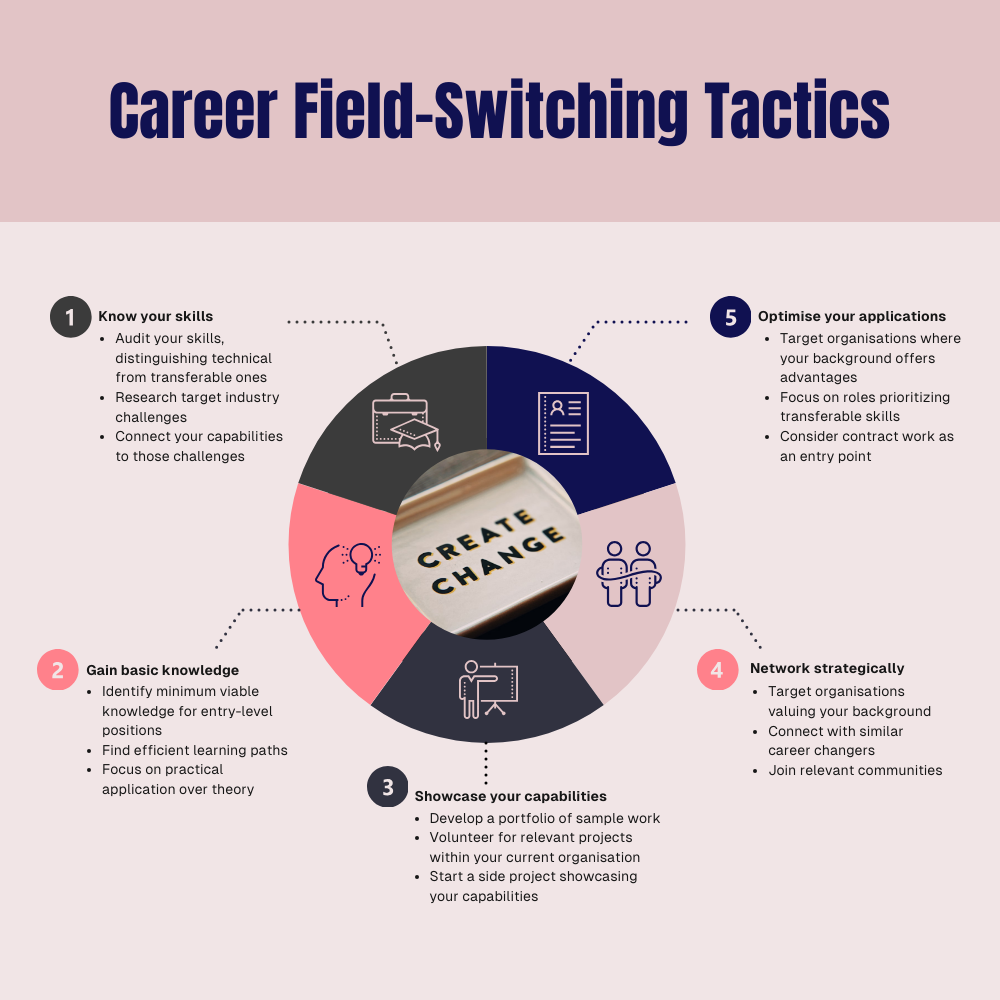ALorem ipsum dolor sit amet, consectetur adipiscing elit. Maecenas eu porta tellus. Mauris sit amet efficitur velit, vitae mollis ipsum. Cras a facilisis sem, vulputate accumsan diam. Praesent molestie, mauris nec dictum condimentum, sem metus lobortis orci, vitae auctor nunc ante et nunc. Phasellus dui ligula, hendrerit eget urna sed, porttitor sagittis libero. Nam tempor felis quis erat imperdiet pulvinar. Aenean euismod vitae nibh eu pretium. Cras quis elementum risus, nec ultrices felis. Nulla aliquet elementum erat et finibus. Quisque aliquam quam ultrices nibh congue sollicitudin
You've reached that pivotal moment. The realisation strikes that your current career path no longer aligns with who you are or who you want to become. But then comes the paralysing thought: "How can I possibly switch careers when I have zero experience in my target field?"
This fear keeps countless professionals trapped in unfulfilling roles, believing the experience gap is too wide to cross. Yet every day, people successfully transition into entirely new industries without relevant experience. Their journeys aren't about luck or connections. They're about strategy, persistence, and understanding the hidden dynamics of career transitions.
The greatest obstacle to career transformation isn't lack of experience. It's the misconception that experience is the only currency valued in the professional marketplace.
Before diving into strategies, let's draw inspiration from those who've successfully navigated this journey.
Natalie spent three years planning and executing corporate events before being retrenched during COVID-19 when the events industry ground to a halt. With her entire sector effectively frozen, she pivoted to a brand strategy role. With no formal brand strategy experience, she leveraged her deep understanding of event identity and experience design to excel in brand identity development. Her ability to craft cohesive event experiences translated directly to creating consistent brand touch-points.
Key strategy: Natalie repositioned her event planning portfolio to highlight the strategic thinking behind each experience design, emphasising how she translated client values into tangible experiences—a core skill in brand strategy.
After hopping between ten different jobs as a UI/UX designer, Fabian finally found his perfect fit as a product strategist. His varied design experiences across different industries gave him unique insights into user needs and product functionality. While he lacked formal product strategy credentials, his design background provided a valuable perspective on connecting user experience to business objectives.
Key strategy: Fabian focused on skills over credentials, highlighting how his design methodology applied directly to product strategy and decision making processes.
These stories share a common thread. Each person recognised that experience isn't just about job titles. It's about the skills, mindsets, and capabilities developed throughout their professional journey. Their success came from strategically reframing their background in terms relevant to their target fields.

The foundation of any successful career change is a clear understanding of the value you bring regardless of industry-specific experience.
Action items:
Remember, employers hire people to solve problems. Your task is to demonstrate how your unique background equips you to solve their problems in ways that traditional candidates cannot.
Many career changers struggle with imposter syndrome during this process, questioning whether their skills truly translate. Remember that overcoming imposter syndrome starts with acknowledging your legitimate skills, regardless of where you developed them. Focus on capabilities, not credentials.
While you don't need years of experience in your target field, you do need to speak its language and understand its fundamentals.
Action items:
The goal isn't to match the knowledge of a 10-year veteran but to develop enough foundational understanding to engage meaningfully in your target field. This focused approach prevents the common trap of endless preparation and credential-collecting.
For those concerned about managing this learning process alongside existing responsibilities, our guide on 5 Signs You're Experiencing Burnout offers valuable insights on maintaining balance while pursuing ambitious goals.
The most challenging aspect of career transitions is demonstrating capability without formal experience. Innovative approaches to building evidence can overcome this obstacle.
Action items:
The digital age offers unprecedented opportunities to demonstrate skills without formal employment. A GitHub repository, design portfolio, or industry-specific blog can provide compelling evidence of capability that traditional CVs cannot.
Creating materials that showcase your abilities in your target field will also help when assembling your CV. Our Resume Without Work Experience guide provides valuable frameworks for highlighting relevant skills and projects, particularly when transitioning to a new field.
Career transitions rely heavily on human connections. Without experience to speak for you, relationships become even more crucial.
Action items:
The most effective networking isn't about asking for jobs. It's about seeking insight, guidance, and gradually becoming known within your target community. As you build these relationships, focus on how your unique background creates value rather than apologising for your lack of traditional experience.
When formally applying for roles, strategic positioning significantly increases your chances of breaking through the experience barrier.
Action items:
Remember that your goal is to find the intersection of organisations that need your transferable skills and those open to non-traditional candidates. This targeted approach is far more effective than mass applications to conventional positions.
Changing careers without experience isn't about pretending the experience gap doesn't exist. It's about strategically bridging that gap through transferable skills, demonstrated capability, and compelling positioning.
The most successful career changers understand that every professional background, no matter how seemingly unrelated, contains valuable elements that can be leveraged in new contexts. By focusing on the problems you can solve rather than the credentials you lack, you transform what seems like a liability into a potential advantage.
At WCFC Academy, we've developed frameworks specifically for career changers navigating these challenging transitions. Through strength-based coaching and proven methodologies, we guide ambitious professionals to discover paths that might not be obvious but lead to fulfilling career transformations.
Ready to break free from the constraints of your current career path? Take the first step today with our free Gallup StrengthsFinder Assessment. Understanding your innate strengths provides the foundation for identifying the right career direction and articulating your unique value proposition. Let's get to building unshakable professional confidence now.
“Raesent molestie, mauris nec dictum condimentum, sem metus lobortis orci, vitae auctor nunc ante et nunc ligula”



Your potential is infinite. Our mission is to activate and unleash it in the right environment.